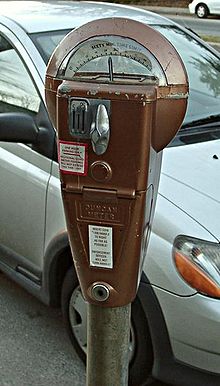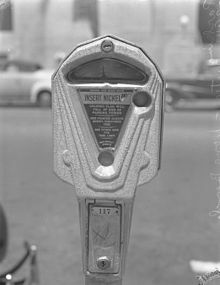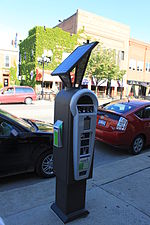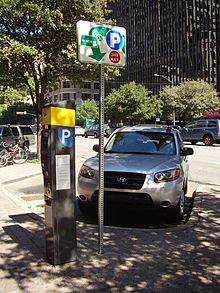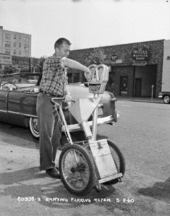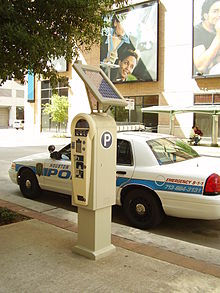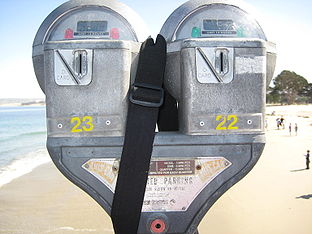- Parking meter
-
A parking meter is a device used to collect money in exchange for the right to park a vehicle in a particular place for a limited amount of time. Parking meters can be used by municipalities as a tool for enforcing their integrated on-street parking policy, usually related to their traffic and mobility management policies.
Contents
History
Holger George Thuesen and Gerald A. Hale designed the first working parking meter, the Black Maria, in 1935. The History Channel's... History's Lost and Found documents their success in developing the first working parking meter. Thuesen and Hale were engineering professors at Oklahoma State and began working on the parking meter in 1933 at the request of Carl C. Magee of Oklahoma City, Oklahoma, United States. [1] The world's first installed parking meter was in Oklahoma City on July 16, 1935.[2][3][4]
Industrial production started in 1936 and expanded until the mid '80s. The first models were based on a coin acceptor, a dial to engage the mechanism and a visible pointer and flag to indicate expiration of paid period. This configuration lasted for more than 40 years, with only a few changes in the exterior design, like the double-headed version and the incorporation of new materials and production techniques.
Upon insertion of coins into a currency detector slot or swiping a credit card or smartcard into a slot, and turning a handle (or pressing a key), a timer is set within the meter. Some locations now allow payment by mobile phone (to remotely record payments for subsequent checking and enforcement). [5] A dial or display on the meter indicates the time remaining. In many cities, all parking meters are designed to use only one type of coin. Use of other coins will fail to register, and the meter may cease to function altogether. For example, in Hackensack, New Jersey all parking meters are designed for quarters only.[6]
In 1960, New York City hired its first crew of "meter maids"; all were women. It was not until 1967 that the first man was hired.[7]
In the mid '80s, a digital version was introduced, replacing the mechanical parts with electronic components: boards, keyboards and displays. This allowed more flexibility to the meter, as an EEPROM chip can be reconfigured more easily than corresponding mechanical components.
By the beginning of the '90s, millions of parking meter units had been sold around the world, but the market was already looking into new solutions, like the collective pay and display machines and new forms of payment that appeared along with electronic money and communication technologies.
Modern advances
See also pay by phone parking
More modern parking meters are generically called multispace meters (as opposed to single space meters) and control multiple spaces per block (typically 8-12) or lot (unlimited). While with these meters the parker may have to walk several car lengths to the meter, there are significant benefits in terms of customer service, performance and efficiency.[8] Multispace meters incorporate more customer-friendly features such as on-screen instructions and acceptance of credit cards for payment—no longer do drivers have to have pockets full of coins on hand. They also have many performance benefits that keep them performing better. While they still may be prone to coin jams and other types of vandalism, most of these meters are wireless and can report problems immediately to maintenance staff, who can then fix the meters so that they are not out of service for very long.
With pay by space meters, the driver parks in a space, goes to the meter and enters their space number and payment. The meter memorizes the time remaining, and enforcement personnel press the bay buttons to check for violations.
Other advances with parking meters include vehicle detection technology, which allows the pay by space meters to know when there is a car parked in a space. This opens the door for benefits for parking managers, including providing way-finding (directing drivers to unoccupied spaces via the web or via street signs), enabling remote violation detection, and gathering vital statistics about parking supply and demand.
Another alternative to the traditional parking meter is the use of personal parking meters (in-car meters), small mobile devices that are purchased by the motorist, with a pre-paid parking bank used by the motorist to pay for on-street parking fees. Another technology offers the possibility of reloading money (parking time) to the device via a secure Internet site.
New York City retired its last spring-loaded, single-space, mechanical parking meter at 10:25 a.m. on December 20, 2006. It was located at the southwest corner of West 10th Street and Surf Avenue in Coney Island. “The world changes. Just as the [subway] token went, now the manual meter has gone,” said Iris Weinshall, the city’s transportation commissioner, at a small ceremony marking the occasion, the New York Times reported. The new digital meters, which now account for all of the city's 62,000 single-space parking meters, are more accurate and more difficult to break into.
Another advancement with parking meters are new solar-powered meters that accept credit cards and still coins as well.[9] They were recently added into the Los Angeles, and Mayor Antonio Villaraigosa stated “the city’s Department of Transportation had projected the 10,000 Coin & Card parking meters installed over the last six months would generate 1-1.5 million in revenue each year”.[10] These parking meters replace the top of the meter, but continuing to keep the same pole, and use solar power, which can help with sending technicians a wireless signal when in need for repair. These credit card machines accept Visa, MasterCard, and American Express, and can vary at different locations. DDOT (The District Department of Transportation) states that this new parking meter will provide: “better return on tax payer’s investment, a variety of options, reduced maintenance, a variety of easy payment options, and increased reliability”.[11]
Security issues
Parking meters are exposed to the elements and to vandals so protection of the device and its cash contents is a priority. The meters are frequently targeted in areas where parking regulations and enforcement are widely perceived to be unfair and predatory.
Some cities have learned the hard way that these machines must be upgraded regularly, essentially playing an arms race with vandals. In Berkeley, California, the cut-off remains of meter poles were a common sight during the late 1990s, and parking was largely free (and anarchic) throughout the city until the city government installed digital parking meters with heavier poles in 2000 (which were eventually vandalized as well).[12]
Other cities have turned to having meters accept only cards that serve this purpose (such as smart cards). However, the expensive card-reading device inside has replaced the money as targets of theft.
Legality
Parking meters have been challenged in court many times for many many years, but are considered legal if the parking meters are used for purposes of parking regulation and not for revenue purposes. In a 1937 case in Oklahoma,[13] H.E. Duncan contended that the ordinances impose a fee for the free use of the streets, which is a right of all citizens of the state. The Courts ruled that free use of the streets is not an absolute right, but agreed with an unpublished 1936 Florida court decision that said, "If it had been shown that the streets on which parking meters have been installed under this ordinance are not streets where the traffic is sufficiently heavy to require any parking regulations of this sort, or that the city was making inordinate and unjustified profits by means of the parking meters, and was resorting to their use not for regulatory purposes but for revenue only, there might have been a different judgment."
The very first parking meter ticket resulted in the first court challenge to metered parking enforcement. Rev. C.H. North of Oklahoma's City's Third Pentecostal Holiness Church had his citation dismissed when he claimed he had gone to a grocery store to get change for the meter.[14]
The Supreme Court of North Carolina judged that a city could not pledge on-street parking meter fee proceeds as security for bonds issued to build off-street parking decks. The court said, "Streets of a municipality are provided for public use. A city board has no valid authority to rent, lease or let a parking space on the streets to an individual motorist 'for a fee' or to charge a rate or toll therefor. Much less may it lease or let the whole system of on-street parking meters for operation by a private corporation or individual." [15]
In 2009, a lawsuit filed by the Independent Voters of Illinois/Independent Precinct Organization (IVI-IPO) claimed the City of Chicago’s 2008 concession agreement for the operation of its parking meters to a private company violated state law.[16] In November, 2010, certain portions of the suit were thrown out by the Cook County Circuit Court, including the claim that the city was using public funds unlawfully to enforce parking regulations after it was decided by the presiding judge that the city retained its ability to write tickets and enforce parking laws.[17] However, the judge allowed other parts of the suit to stand, including an accusation that the city unlawfully conceded some of its policing power and its ability to set parking and traffic policy to the private company in the concession agreement.[17] As of January, 2011, the suit remains active, with the City of Chicago maintaining that the city retains all policing power, maintains responsibility for traffic management, and, through the concession agreement, retains control over rates. [18] [19]
Variable pricing
Dr. Donald Shoup argues that parking meters should have variable prices to maintain an 85% occupancy rate.[20] This would facilitate an optimum turnover of vehicles resulting in an optimum turnover of customers for roadside shops. It would also reduce the amount of time wasted looking for a place to park.
Alternatives
In the American states of Texas, Maryland, California, Massachusetts and the whole of the European Union, holders of a Disabled parking permit are exempt from parking meter fees. Previously, Virginia also allowed persons with disabled plates or placards to park at meters without paying, but due to misuse of the privilege by persons who used permits which belonged to others, the privilege was revoked. In some other states handicapped parking meters exist, which not only must be paid at the same rate as regular meters, but one will also be subject to receiving a violation ticket if a valid handicap license plate or placard is not displayed on the vehicle.
Some cities have gone to a device called a Parkulator, in which the user purchases a display device, usually for $5 or $10, then loads it with as much time as they care to purchase.[21] They then activate the device when they park at a location, and place the display device on their dashboard so it is visible from the front windshield. The device counts down the time remaining on the device while it remains activated. When they return, then the clock stops running, and the person does not overpay for time unused. In the UK it is now possible to park and pay with credit or debit card through a dedicated telephone service.[22] Civil Enforcement Officers that patrol the parking area are automatically informed through their hand held devices.
See also
- Coupon parking
- Decriminalised parking enforcement
- Disc parking
- Pay and display
- Pay by phone parking
- Parking guidance and information
- Parking attendant
- Valet parking
- Parking Wars
People
- Meade McClanahan, sued city of Los Angeles to block installation of parking meters
References
- ^ Chan, Sewell. "New York Retires Last Mechanical Parking Meter." The New York Times. December 20, 2006.
- ^ Inglewood Website - News Details
- ^ Park-O-Meter
- ^ "Coin-in-Slot Parking Meter Brings Revenue to City" Popular Mechanics, October 1935 mid-right side of page article
- ^ Wisdom, Martin. "Pay For DC Parking Meters By Cell Phone". My FOX DC. http://www.myfoxdc.com/dpp/news/web_links/pay-for-dc-parking-meters-by-cell-phone-040910. Retrieved 1/21/2011.
- ^ "Traffic Division". City of Hackensack. http://www.hackensack.org/content/49/145/262/default.aspx. Retrieved 1/21/2011.
- ^ Dougherty, Conor (February 3, 2007). "The Parking Fix". The Wall Street Journal.
- ^ Kupferman, Dan. "Why Multi-Space parking meters?". Parking Network. http://www.parking-net.com/ShowCase/29314/Why-Multi-Space-parking-meters-. Retrieved 1/13/2011.
- ^ Mathis, Sommer. "D.C. Testing Solar-Powered, Credit Card Parking Meters". DCist. http://dcist.com/2010/01/dc_tests_solar-powered_parking_mete.php. Retrieved 1/12/2011.
- ^ Lovelace, Dennis. "New Credit Card-Use Parking Meters Raking In The Dough". My FOX LA. http://www.myfoxla.com/dpp/news/local/new-credit-card-use-parking-meters-raking-in-the-dough-20101014. Retrieved 1/12/2011.
- ^ "DDOT Starts Installation of New Solar-Powered Single Space Meters". District Department of Transportation. http://ddot.dc.gov/DC/DDOT/About+DDOT/News+Room/DDOT+Starts+Installation+of+New+Solar-Powered+Single+Space+Meters. Retrieved 1/12/2011.
- ^ Demian Bulwa, "Chicanery tops meters in Berkeley: Vandals wanting to park free put city in yet another jam," San Francisco Chronicle, 25 January 2004, A21.
- ^ "OSCN Found Document:Ex parte DUNCAN". Oscn.net. 1936-12-10. http://www.oscn.net/applications/oscn/deliverdocument.asp?citeid=18188. Retrieved 2010-11-12.
- ^ Inc Magazine, Oct 1, 2002
- ^ Britt v. Wilmington, 236 N.C. 446, 73 S.E.2d 289 (1952)
- ^ "Independent Voters of Illinois Independent Precinct v. State of Illinois". Circuit Court of Cook County, IL. http://www.thenewspaper.com/rlc/docs/2009/il-metersuit.pdf. Retrieved 1/24/2011.
- ^ a b Dumke, Mick. "Parking Meter Lawsuit Allowed to Proceed". Chicago News Cooperative. http://www.chicagonewscoop.org/parking-meter-lawsuit-allowed-to-proceed/. Retrieved 1/24/2011.
- ^ Saffold, CFO City of Chicago, Gene. "Letter Concerning IVI-IPO Lawsuit". City of Chicago. http://www.cityofchicago.org/content/dam/city/depts/rev/supp_info/ParkingMeter/IPOSLawSuit.pdf. Retrieved 1/24/2011.
- ^ Baxter, Brian. "Chicago's $1.16 Billion Parking Meter Privatization 'A Watershed Event'". The AM Law Daily. http://amlawdaily.typepad.com/amlawdaily/2008/12/chicagos-116-bi.html. Retrieved 1/24/2011.
- ^ Elizabeth Press (2007-12-20). "Illustrating Parking Reform with Dr. Shoup". Streetfilms. http://www.streetfilms.org/illustrating-parking-reform-with-dr-shoup/. Retrieved 2010-11-12.
- ^ Hill-Holtzman, Nancy. "Portable Parking Meters a Tick Away". Los Angeles Times. http://articles.latimes.com/1992-01-19/news/we-802_1_parking-meters. Retrieved 1/18/2011.
- ^ Leyden, John. "Park and pay by mobile comes to London". The Register. http://www.theregister.co.uk/2004/01/09/park_and_pay_by_mobile/. Retrieved 1/18/2011.
External links
- Oklahoma City site of first parking meter. (Historic film)
- U.S. Patent 2,118,318 - Coin controlled parking meter
- "Parking Meters Yield $50,000 A Year" 1951 article with excellent illustration of coin operated meters
- POM Parking Meters
- The Parking Meter Page
- Articles from the Wausau Daily Herald
- Metergate from the SF Times (archived)
- Brink's 1978 parking meter theft
- Saskatoon, SK - the first Canadian City to offer cell phone parking payment option for its parking meters October 21, 2005
- Parking meter payment by cell phone from Slashdot, June 26, 2006
- Voice Of America Video
- New Parking Meter, calls you when time is up - with Pictures
- Sensor based parking meter with push enforcement, bike share, wayfinding, and validation
- Secure Storage Technologies Smart Parking Meter
Categories:- Street furniture
- 1932 introductions
- Parking
Wikimedia Foundation. 2010.

